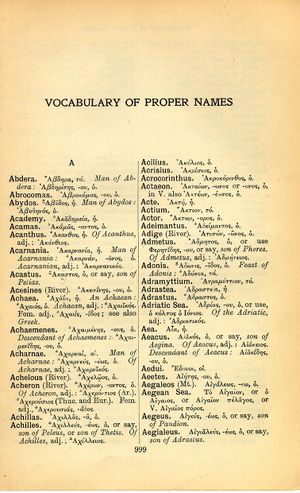Adrastus: Difference between revisions
From LSJ
τὸ γὰρ πράττειν τοῦ λέγειν καὶ χειροτονεῖν ὕστερον ὂν τῇ τάξει, πρότερον τῇ δυνάμει καὶ κρεῖττόν ἐστιν (Demosthenes 3.15) → for action, even though posterior in the order of events to speaking and voting, is prior in importance and superior
(Names) |
(6_1) |
||
| Line 1: | Line 1: | ||
{{WoodhouseENELnames | {{WoodhouseENELnames | ||
|Text=[[File:woodhouse_999.jpg|thumb|link={{filepath:woodhouse_999.jpg}}]]Ἄδραστος, ὁ. | |Text=[[File:woodhouse_999.jpg|thumb|link={{filepath:woodhouse_999.jpg}}]]Ἄδραστος, ὁ. | ||
}} | |||
{{Lewis | |||
|lshtext=<b>Ā̆drastus</b>: i. m., = Ἄδραστος,<br /><b>I</b> [[king]] of [[Argos]], [[father]]-in-[[law]] of [[Tydeus]] and [[Polynices]], [[who]], acc. to the [[fable]], [[saw]] [[them]] [[both]] [[die]], and turned so [[pale]] from [[grief]] [[that]] he [[never]] recovered his [[former]] [[complexion]]; [[hence]]: [[pallor]] Adrasti, Verg. 6, 480 Serv.; cf. Ov. P. 1, 3, 79; id. F. 6, 433; Stat. Th. 4, 74 al. | |||
}} | }} | ||
Revision as of 08:04, 13 August 2017
English > Greek (Woodhouse)
Ἄδραστος, ὁ.
Latin > English (Lewis & Short)
Ā̆drastus: i. m., = Ἄδραστος,
I king of Argos, father-in-law of Tydeus and Polynices, who, acc. to the fable, saw them both die, and turned so pale from grief that he never recovered his former complexion; hence: pallor Adrasti, Verg. 6, 480 Serv.; cf. Ov. P. 1, 3, 79; id. F. 6, 433; Stat. Th. 4, 74 al.

